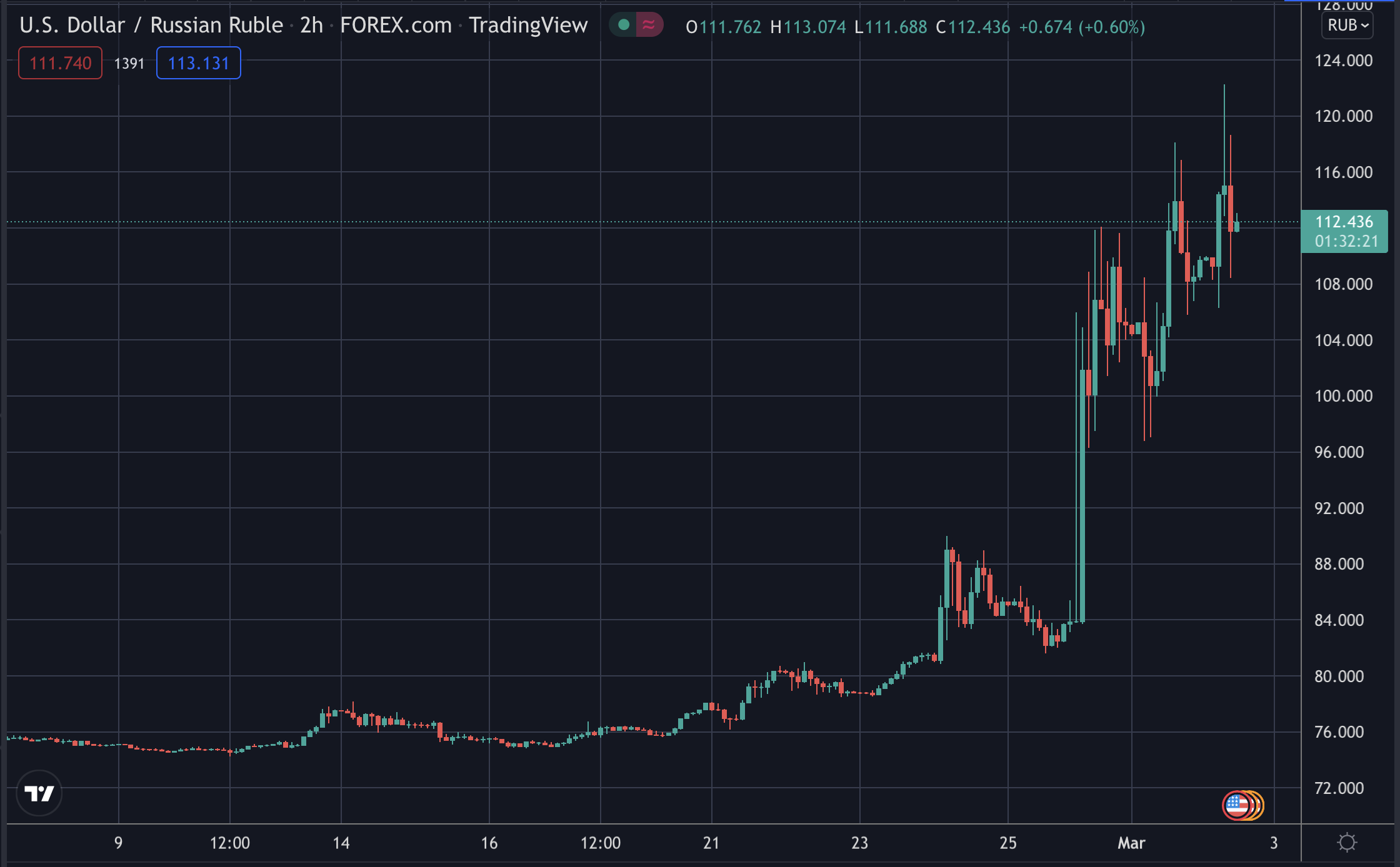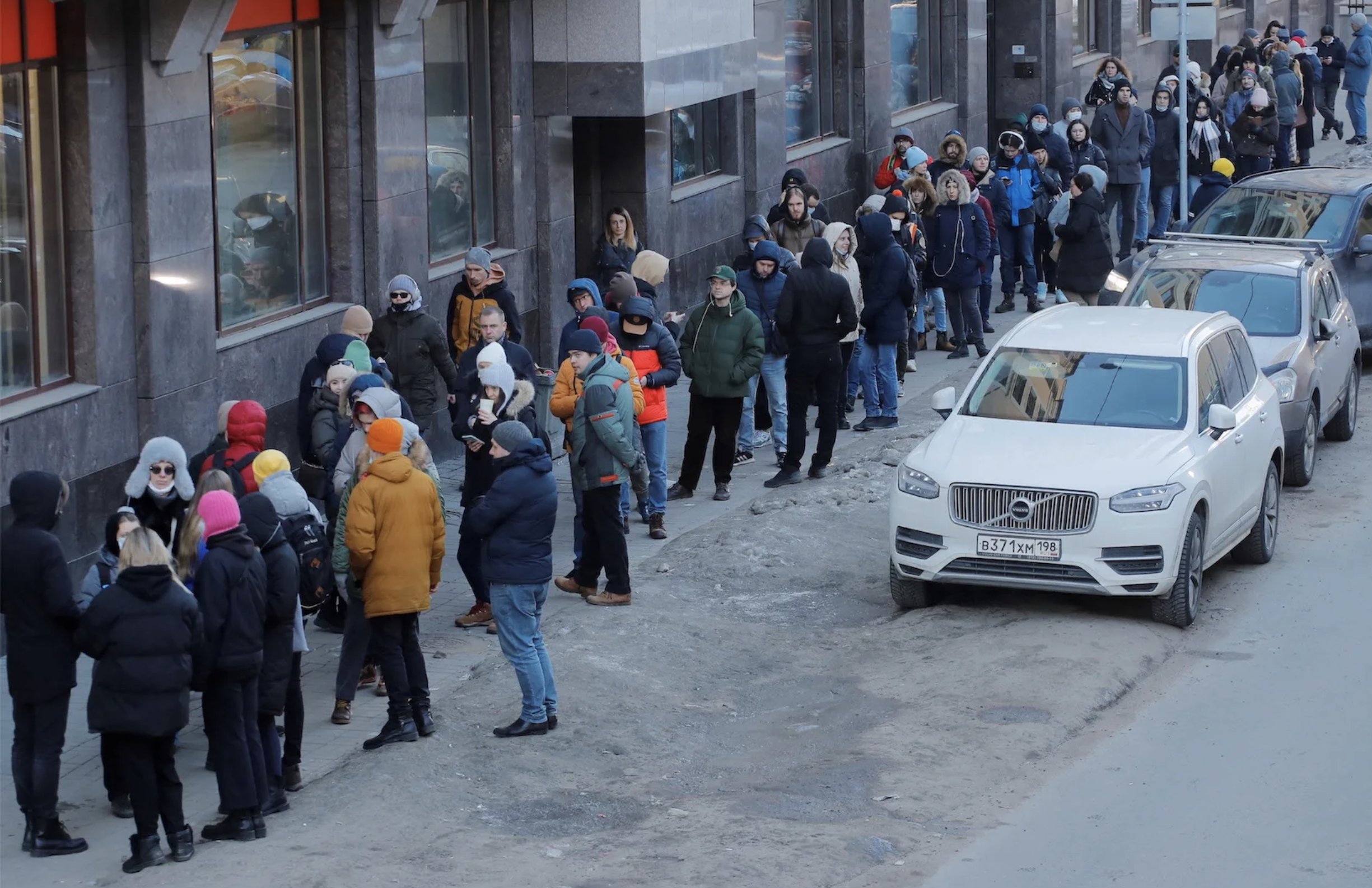Visa and MasterCard have suspended their operations in Russia following the invasion of Ukraine.
“We will continue to work with regulators in the days ahead to abide fully by our compliance obligations as they evolve,” MasterCard said.
Russian media reports that tourists abroad cannot pay with their cards in shops and hotels, or withdraw cash from ATMs.
“We are vacationing in Turkey, we have not been able to pay in stores with a card for several days, or withdraw money from an ATM too. It’s good that we took enough dollars with us,” said Maria Zaikova, a tourist from Moscow.
The cards issued by VTB Group, Sovcombank , Novikombank and Promsvyazbank no longer work. Apple Pay and Google Pay have also stoped functioning for Russians at home or abroad.
In addition stringent capital controls came into force on Monday with Russians prohibited from transferring more than $10,000 abroad.
The ruble further fell however another 20% to above 120 per dollar in the official rate which some say is not accessible to the public.

The measures “are unlikely to stabilize the situation, which depends on powerful factors that go beyond regulation,” the Chief Analyst at TeleTrade Mark Goykhman says before adding:
“Further developments will be determined by geopolitics, hostilities, sanctions, financial market sentiment, prices and volumes of exports and imports, internal investment conditions and production.”
Numerous companies are exiting the country as the invasion of Ukraine continues, including some of the world’s biggest shipping companies, as well as DHL, Eni, ExxonMobil and Boeing.

Long bank queues are now reported in Russia amid the falling value of the ruble, concerns that their cards might stop working, and even worries that their deposits might be seized.
That’s while EU announced today that seven Russian banks have been excluded from SWIFT, including VTB Bank as well as Bank Otkritie, Novikombank, Promsvyazbank, Rossiya Bank, Sovcombank and VEB (Vnesheconombank), effective immediately.
Russians lined up at banks and ATMs in fear for the fate of their savings as Western sanctions tanked the ruble. pic.twitter.com/q1vTq5BSGP
— DW News (@dwnews) March 2, 2022
Bitcoin now remains one of the few ways Russians can transfer internationally with cryptos generally rising as ethereum just about crossed $3,000.
There’s debate on whether the biggest centralized crypto exchanges should ban Russia from their platforms, but most of the buying and selling in RUB is probably peer to peer.
That’s where Russian individuals that have bitcoin give their bank account details to other Russians that want bitcoin, with this method of exchanging being very, very difficult to stop, if at all possible.
Where Russian major companies are concerned however, crypto might be too complex compared to other alternatives, like disguised front outlets in say Kazakhstan.
The biggest initial damage therefore might be the exodus of foreign companies from Russia, but the whole package of sanctions is causing some disruptions.
Yet evidently not enough to stop the war, but there are signs the Russian government is growing concerned about the effect of non-material sanctions.
Russia’s Foreign Minister Sergei Lavrov said they did not expect athletes, cultural figures and journalists to be shunned.
FIFA, Formula One, Eurovision, and a very long list of cultural entities have shunned Russia following its invasion of Ukraine.
This may have even bigger effects than financial sanctions as Russians can no longer continue as normal, and Russia as a country might start feeling a bit like North Korea.
RT and Sputnik have now also been banned from Europe, while Russia tries to bomb Ukrainian TV stations as well as Universities.
Тварина направляє зброю на цивільних. Мелітополь pic.twitter.com/qycM8Kgmpz
— Кам’янський димар (@huidneprodym) March 1, 2022
The heroic defense of their country has now inspired many volunteers to head for Ukraine in a war that many see as simply against democracy itself and that whole golden formula of the enlightenment where you have a government accountable to the voters under a rule of law.
After dismantling all that in his own country, and after impoverishing Russians which have seen a 50% fall in their GDP in the past decade even before these sanctions, Russia’s dictator Vladimir Putin is now seemingly trying to do the same to other countries.
His aim in Ukraine is regime change, which we take as an installation of a dictatorship, in a challenge to the entire western civilization.
And it is that challenge to the very way of life of a civilization that explains why many cultural and business entities have taken it upon themselves to shun Russia even without government directions.
Because ultimately this is a war against an idea, an attempt to regress back to midgets in castles ruling without checks or balances to the destruction of other countries and, to a great extent, to the destruction of their own country too.
 trustnodes.com
trustnodes.com